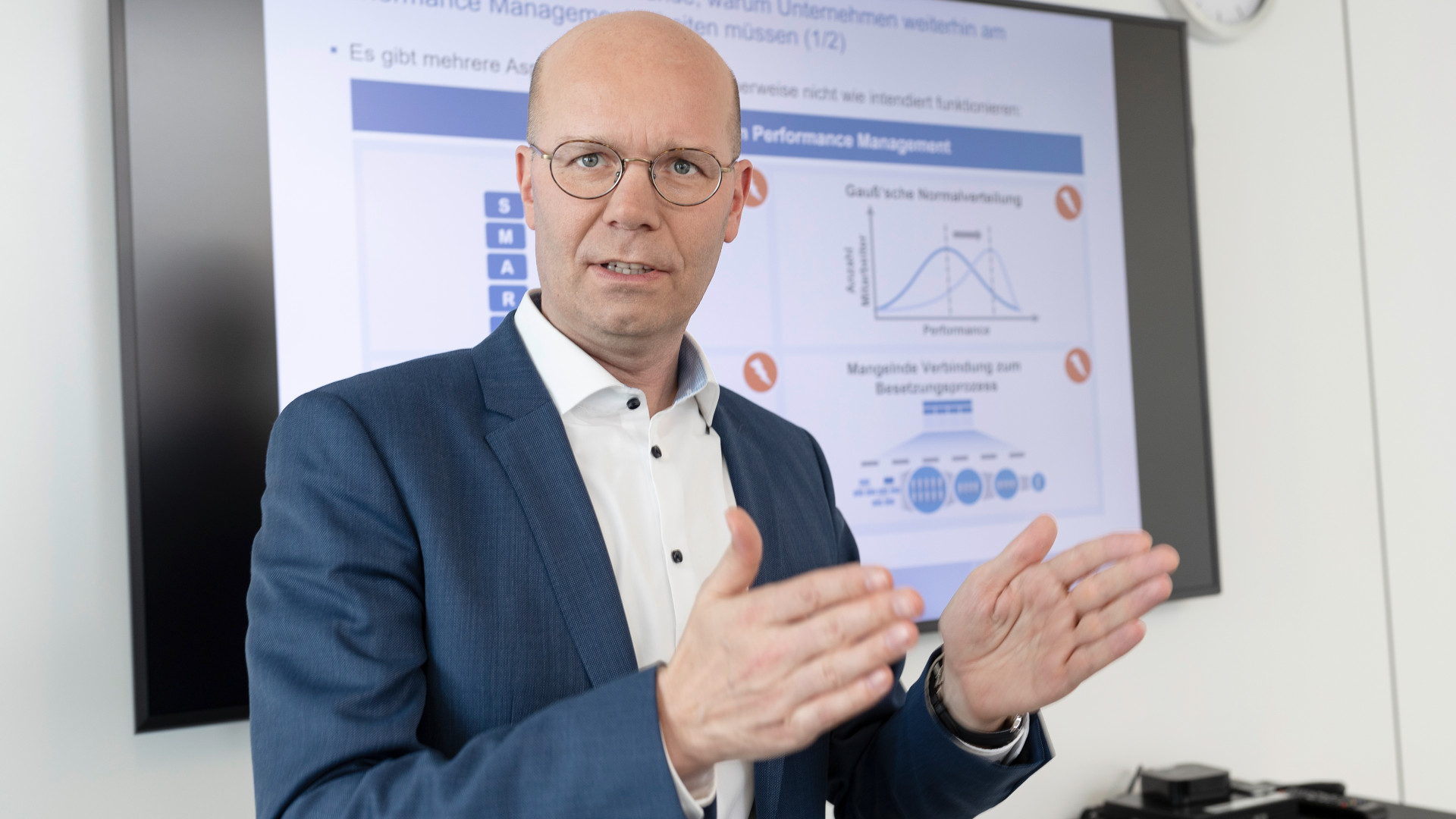The hkp/// group experts Frank Gierschmann and Sabrina Müsel discuss the current use of artificial intelligence and modern technology in talent management.
Mr. Gierschmann, Mr. Jacob, artificial intelligence, or AI, is increasingly becoming part of our private and professional lives. Is the same true for talent management?
Sabrina Müsel: Talent management is by no means an exception when it comes to this development. In fact, it affects all employees throughout their entire time at the company. But some of the things referred to as AI aren’t AI in the true sense. AI is an umbrella term for a large variety of methods and models that aim to perform intelligent behavior by means of an extremely broad machine database.
Frank Gierschmann: … and there are very few applications that actually do this, even though they keep coming closer to fulfilling this definition. But whichever way you look at it, there really is a lot going on in the market and also in talent management.
What specific examples can you name?
Frank Gierschmann: There are many possible applications. There is currently intense discussion on the topic of using AI tools in classic psychological diagnostics, for example. In Germany, the language analysis tool Precire is the topic of heated discussion. Some companies have started testing the social recruiting tool Eightfold and free-of-charge products available to everyone such as Crystalknows are becoming widespread.
Sabrina Müsel: But the majority of companies are reluctant to use these instruments in practice, at least in Germany.
What are the reasons behind this somewhat cautious, skeptical view of AI?
Frank Gierschmann: When it comes to the willingness to use AI, there are regionally significant differences, in general—not only in talent management. You only need to think of the intensive use of surveillance technologies in China or other countries in Asia. And even in the US, the approach to use cutting-edge IT is predominantly one of trial and error. In Europe, and in Germany specifically, things are different.
Sabrina Müsel: In our cultural environment, we generally address the fundamental rules first and then start experimenting, define the specific requirements and framework, etc.. Data protection plays a much more important role here than in the US or Asia.
In other words, Europe’s data protection is holding back the use of AI in talent management?
Sabrina Müsel: Yes and no. Like HR in general, talent management faces special challenges if AI is to be used. We are, after all, dealing with people. And each person has fundamental rights that need to be protected. These include, above all, the right to maintain individual dignity, the right to act with self-determination, and the right to protect privacy.
Frank Gierschmann: In Germany, this procedure is illustrated by the work of the HR Tech Ethics Committee. The approach is not about playing the role of skeptic and restraining technological progress, but instead ensuring that safeguards are in place. I’m sure there will be a European way of using AI, also in talent management. And it will naturally differ from the approaches taken in the US and Asia.
But in what way does the use of AI in talent management breach personal rights?
Frank Gierschmann: AI does not necessarily breach personal rights, but there is a potential risk of misuse, intentional or otherwise. This is why it is so important for us to define corresponding framework conditions.
What specific dangers are posed, in your view?
Sabrina Müsel: Potential problems are not hard to imagine. For example, applicants could feel that their individual dignity is harmed if they are rejected in the application process because of assessments made by non-transparent algorithms. If this selection is made because the AI system has acquired an incorrect decision-making pattern due to a bad data foundation, the quality of the recruiting will also suffer.
Frank Gierschmann: Think of Amazon or Google, for example, where algorithms produced biased results because of the historic data that had been fed in. This resulted in AI preferring men in the personnel selection, the precise opposite of what was intended. This has made certain protagonists prick up their ears.
What does academia have to say about this?
Frank Gierschmann: There are naturally very conservative advocates and skeptics, but there are also some academics who are progressive and open. Take Professor Martin Kersting, for example, one of the leading diagnosticians in the German-speaking world, who said in an initial summary written for the HR magazine that he would be absolutely thrilled if the AI tools under discussion were first used in connection with research projects before being marketed as commercial products. But as things stand, research lacks any real substance, with no clarity on the implications or effects. Using AI becomes an enormous gamble.
Will AI ever replace classic talent management?
Sabrina Müsel: There’s no question of that happening. AI is a technology and not a systematic approach. Talent management cannot be replaced by a technology. But we will see significant changes, brought about by technological progress.
Frank Gierschmann: The current discussion about the use of AI in talent management, and also in HR management overall, provides a taste of what is to come, but doesn’t make it possible to predict everything that is going to happen. But this is precisely the reason why dedicated individuals from all kinds of fields are fighting to take a closer look at the issue at this early stage, create the necessary awareness, and make sure the appropriate conditions are put in place.
How will AI change talent management? How will it look in 20 years’ time?
Frank Gierschmann: Let’s use a few specific scenarios as illustration. First, classic skills management could experience a renaissance, with systems that form dynamic concept clusters instead of the traditional static competency models. The approaches taken by Tandemploy or Talentwunder in Germany in this regard are of great interest.
Sabrina Müsel: Basic and continuing training are further exciting fields of AI applications. They could be used to support the determination of learning needs and to recommend individual learning opportunities to employees dynamically. This is a good example of how AI not only contributes to increased efficiency, but ultimately to a better employee experience. But, as was mentioned earlier, in many fields we are currently in an early phase and after the first tests and applications some of the hype will be replaced with disillusionment—but this is precisely what is so exciting about the current time. We will definitely see some organizations have less positive experience with AI, but there will also be others that can learn from this and identify clear advantages that help them stand out positively from the competition.
Ms. Müsel, Mr. Gierschmann, thank you for taking part in this interview.


